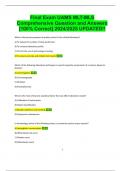Exam (elaborations)
Final Exam UAMS MLT-MLS Comprehensive Question and Answers [100% Correct] 2024/2025 UPDATED!!
- Course
- Institution
Final Exam UAMS MLT-MLS Comprehensive Question and Answers [100% Correct] 2024/2025 UPDATED!! What is the primary purpose of quality control in the clinical laboratory? A) To reduce the number of tests performed B) To increase laboratory profits C) To limit the use of technology in test...
[Show more]



